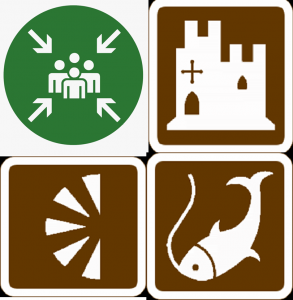Church is not what it was. Then again, life is not what it was either. There are flickering glimpses of church right now which flash past like the images on a zoetrope, but somehow the movement fails to animate them.
Here is a steward welcoming you at the door, welcome restricted to the eyes since a smile cannot be seen beneath the mask and a handshake cannot be given.
Here is a moving tapestry of faces on a Zoom screen, each one a window into another's home and life. If we try to sing together, the inevitable lag means that we cannot hold a shared tune in time.
Here is a home communion : bread and juice, set out within reach of my hand and just out of camera shot.
Here is a pulpit with wires and leads and a camera and audio recorder, but a congregation nowhere to be seen.
Here is somebody sitting before that pulpit on a kitchen stool, and another in a hotel room far from home.
Reflecting on all these, different historic images of church have come to mind:
Here is the church as 'Ekklesia' - people in small numbers (at least to start with) called out from the world to gather together, Here they pledge their loyalty to Jesus and seek to understand what it means. Like the Jewish synagogues of the first Century and beyond, even a small gathering was enough to constitute a congregation. This is the original understanding of the 'gathered' church.

Here is the church as 'Tabernacle' or even 'fortress'. This is a physical statement of the presence of God, serving as a witness to those without and a fortress to those within. Some, far more permanent than the travelling tabernacle, mark the skyline of towns and cities still. The church seen this way is a solid and tangible statement of faith and belief.

Here is the church as 'monastery' - eschewing the physical presence of the former in the thick of things, and going further up the mountain for a better view. This is a calling to be apart from the world...for the sake of the world.

Here is the church as 'skete' - a concept begun in the Coptic church and later adopted by Celtic and even new monastic communities. Here the participants farm or fish or pursue their daily calling, but abide by a rule of life, sharing the same values, worshipping as a rhythm of daily life and only occasionally coming together. They are still participants in a community of faith and witness, bound to its rhythm and values, but they pursue it in their individual callings.

All have strengths, and all have different appeals, but I cannot help wondering whether the 'skete' has unexplored potential for our current circumstances. We live, work and play behind our own front doors, yet nurse a yearning for connection. We want to be identified with this great cause, part of this great kingdom - but cannot stream through the doors of a physical church to declare it as we once did.
Just how tied are we to the need for a physical building, I wonder? Would our discipline hold firm enough to adhere to a rule of life where only God and we were watching?
These are only initial thoughts, and this is an invitation to conversation, but I would love to know what others think.

